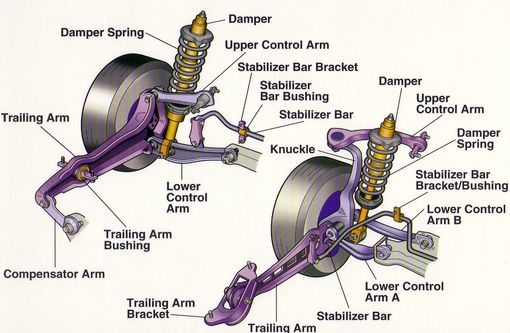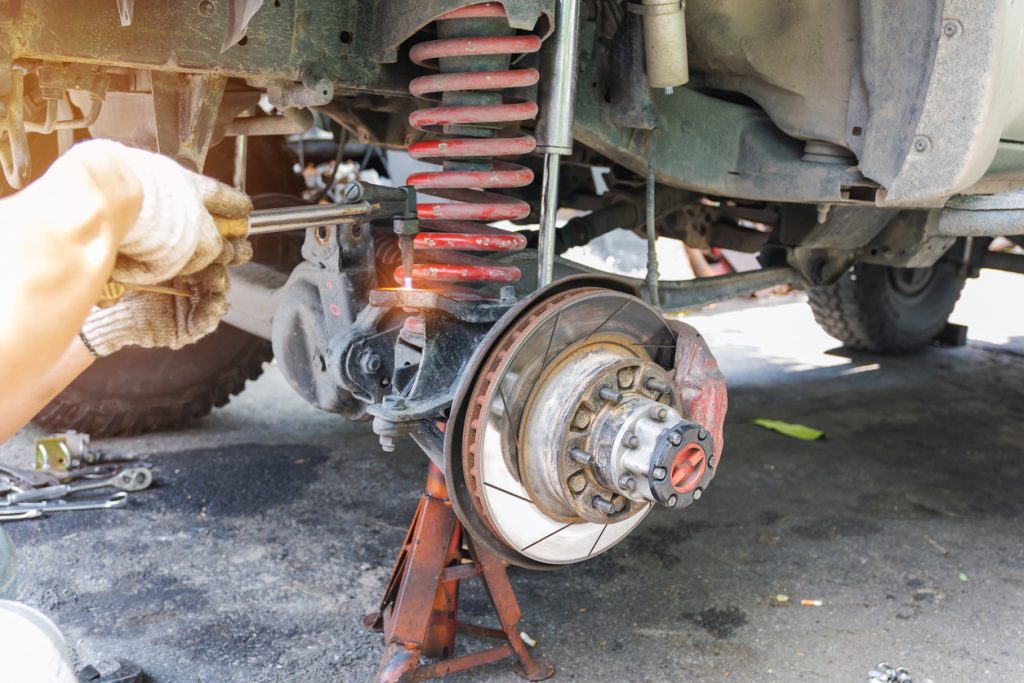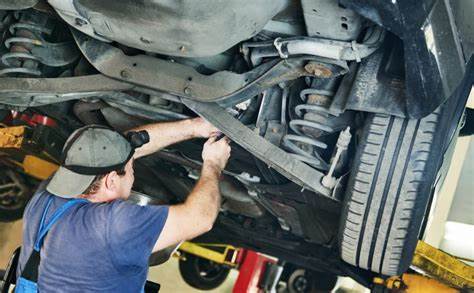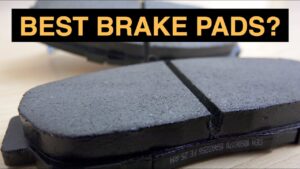Every system in the car acts independently, but, all the designs are interconnected. Malfunction in any one system impacts the functionality of others too. Regular service and inspection of a car are necessary to maintain performance and improve its life. The suspension is an essential part of the system that connects wheels and steering.
A worn-out or malfunctioning suspension directly impacts the other two systems. If you hear noises when you drive over bumps or while turning hard in corners, this means that your suspension has worn out. This article covers some common reasons for car suspension noises and how to fix them.

Table of Contents
What Is Suspension?
A suspension is damper and spring arranged assembled near the wheels and held up the entire car. The dampers also called as shock absorbers are filled will suspension fluid. Also, The spring covers up the damper. This set up is connected to wheels by the ball joints. This complete system is called a suspension. The suspension system depends on the structure and design, and so it varies for every vehicle.

How Do Suspensions Work?
The suspension absorbs the shocks and impact force and provides a comfortable ride. When a car goes over a bump, the wheel experience a sudden impact to the ground, this is technically called as shocks.
These shocks or impact force is initially absorbed by the springs and distributed equally. The shocks that escape the spring is absorbed by the dampers where the fluid absorbs all the bouncing.

A suspension works this way in worst road condition. In a less rough road, the ball joints allow the wheel to move up and down, thus reducing the load and work on the suspension. A car suspension noise arises if any of these function is interrupted.
Why Does My Suspension Make Noise?
If any part of your suspension has worn out or damaged, it affects the functionality of interconnected parts. When the function is interrupted, it causes side effects in this case; the side effects are noises. If you are driving with the worn out or damaged suspension, your car hears squeaky or clunking noises when you make hard turns in corners or when your car goes over a bump and sometimes even while braking. If you ignore the noises and continue to drive, the damage propagates and at worst the suspension, ball joint, or control arm could break.
Common Suspension Problems
The first symptom of a damaged or worn out suspension is that you can feel it harder to drive around corners because the damaged suspension doesn’t support the vehicle at times. Secondly, you can see a change in the height of the car. The car looks down at the sides of the damaged suspension. But it is harder to notice if all the suspensions are damaged.
A damaged suspension affects the alignment of wheels. Like even if you were steering straight, your car keeps on moving towards left or right. This could damage your tires regardless of how many times you change it. The quality of the ride will be affected.

If you drive over a bump with the damaged suspension, the people inside the car can directly feel the bumps which means your suspension fails to absorb shocks. These are some common suspension problems that likely happens. Squeaky Clunky car suspension noises can also be heard because of these issues. An average lifetime of suspension is about 4 to 5 years.
How To Fix All Car Suspension Noises?
Follow these necessary steps to fix your car suspension noises, but all the complicated tasks require special tools and skills. So it is better to leave your car to the professional to look into it.
1. Identify The Cause Of Noise
Mostly all the car suspension problems create noise over time. First, you should identify what causes the suspension to make noise. Identify the problem helps to resolve it quickly. If there is any part of failure, it alone can be replaced. But, if the system hs worn out, then it is recommended to replaces the complete suspension system.

2. Repair Or Replace
As discussed, some parts can be replaced individually, but some should be replaced entirely to resolve the problems. The primary cause of suspension noise is worn out parts. Check if your ball joints are good. Any worn-out ball joints could cause squeaky noises while you turn hard in corners. Replacing the ball joints could restrict the noise.
If the noise persists, check the springs in suspension. The car generally uses helical coil spring. The springs are forced to compress and expand over bumps and pits to absorbs the shocks. Over time, the springs could wear out. Any worn-out springs, when pushed under tension again, would cause noises. Replace the springs of the suspension to restrict noise.
If you still hear noises, it is time to look at your dampers. Check for leaks in your dampers. Dampers without suspension fluid have no medium to absorb the bouncing. When the dampers move without fluids, it will make noise. Check for leaks and arrest it. Also, change the fluid in all dampers at the same time for proper and equal functioning.
3. Service/Inspection
Have a scheduled service and inspection of your vehicle. Compare the history of services to find the work-life of the components. This will help you to save yourself from upcoming problems. This will reduce your cost of maintenance and also improve the life of your car.
4. Drive With Conscious
Driving adequately based on weather and road conditions reduces the risk of damaging the parts of the car. If you know that your road condition is not acceptable, then plan to leave a little earlier so that the roads slow you down, but you can reach your destination on time. Slow down on hard corners because sudden tension on suspensions can reduce its life.

Frequently asked Questions:
So,here are some of the frequently asked questions about why does my Car’s Suspension make noise, how to diagnose etc?
How Do I Know If My Car Has A Bad Suspension?
Notice if the noises are consistent or if the noises are dependent on what you are doing at the time, such as going over speed bumps or while turning the wheel. Some common noises that are associated with suspension concerns
Why Does My Car’s Suspension Make Noise?
Noises from your car’s suspension usually mean you’re in for a bumpy ride, especially if the issue isn’t addressed.
How Do You Diagnose A Suspension Noise Complaint?
Diagnosing a suspension noise complaint can be more complicated than curing a misfire trouble code. Instead of a scan tool, your diagnostics tools are your eyes and ears, but they can be augmented. Like an engine, you are dealing with multiple systems that affect each other.
What Are The Characteristics Of A Noise Noise In Suspension?
Noise Characteristics: The noise will typically be a knocking noise that occurs when the suspension moves or the vehicle changes direction. Diagnostic and Isolation Methods: Inspect the bushing for separation of the metal and rubber. Also, look at the rubber for cracks.
What Is The Principle Of A Suspension?
A suspension works on the principle of force dissipation which involves converting force into heat thus removing the impact that force would have made. It uses springs, dampers and struts to achieve this. A spring will hold the energy while a damper will convert it into heat.
What Are The Different Suspension Parts?
Suspension parts include springs, dampers and sway bars. The suspension of a car is actually part of the chassis, which comprises all of the important systems located beneath the car’s body. These systems include: So the suspension is just one of the major systems in any vehicle.
Conclusion
These are standard measures to fix your car suspension noises and avoid it in the future. If you hear any noises in your car, then go check it out and repair it or replace it if it is worst. It is our responsibility to drive with consciousness.
Follow us to know more about similar issues and learn how to fix them. Let us know your suggestions and queries in the comment section below so that we can answer it and others can also learn from it.



